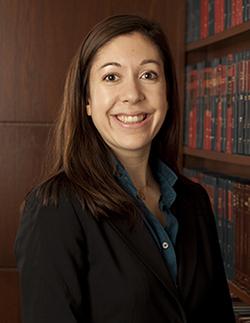Columbia Law Graduate Picked for Prestigious U.S. Supreme Court Clerkship
Beatrice Franklin '14 Will Serve as Clerk to Justice Ruth Bader Ginsburg '59
New York, March 30, 2016—Columbia Law School alumna Beatrice C. Franklin ’14 is now preparing for one of the most illustrious assignments in the legal world: A clerkship at the Supreme Court of the United States. Starting in the summer of 2017, Franklin will clerk for Associate Justice Ruth Bader Ginsburg ’59.
For 134 years, young lawyers have coveted the job at the nation’s highest court to work closely with the justices, helping to research and to write on some of the most important cases in American law. The experience also opens doors to great professional opportunities in law, government, and academia. Early in their careers, three of the eight sitting justices—John Roberts, Stephen Breyer, and Elena Kagan—had served as Supreme Court law clerks.
| Beatrice Franklin '14 looks forward to clerking for fellow Columbia Law School graduate Associate Justice Ruth Bader Ginsberg '59 starting next summer. |
After graduating from Columbia Law School in 2014, Franklin was a litigation associate at the firm of Paul, Weiss, Rifkind, Wharton, & Garrison. Last fall she became a clerk for Judge Jesse M. Furman at the U.S. District Court for the Southern District of New York. Franklin will move to another federal court this fall, clerking for Judge Susan L. Carney of the U.S. Court of Appeals for the Second Circuit, before joining Justice Ginsburg’s staff.
Columbia Law School played an important part in Franklin’s application for her Supreme Court clerkship, which included an article she wrote for the Columbia Human Rights Law Review as one of her writing samples. “I also had letters of recommendation and lots of support from the faculty,” she said. Franklin credited professors Jessica Bulman-Pozen, Olatunde Johnson, Gillian Metzger ’96, Daniel Richman, and Anne Green, the director of academic counseling and judicial programming, for guiding her through the application process.
Franklin was a standout student at Columbia Law School, earning a variety of awards and honors. She graduated with the Ruth Bader Ginsburg Prize for J.D. candidates who have earned honors as a James Kent Scholar each year at the Law School. She also won prizes for best oralist and best brief at the annual Harlan Fiske Stone Moot Court Competition, where she argued before a panel of judges that included U.S. Supreme Court Associate Justice Kagan. She served as an articles editor at the Columbia Human Rights Law Review and represented domestic violence victims as part of the Courtroom Advocates Project, one of the Law School’s in-house pro bono programs. She worked as a teaching assistant for Professor Johnson, who had served as a law clerk for Supreme Court Justice John Paul Stevens.
Once Franklin finishes working for Justice Ginsburg, she wants to be a litigator. As a litigation associate, she grew interested in writing about financial instruments as part of a $2 billion derivatives-trading lawsuit. “It’s an innovative and exciting field, in terms of the finance itself and the law surrounding it,” she said. “I’m attracted to being at a firm where I’ll be able to do both significant pro bono cases and more complex financial cases like the ones I worked on at Paul, Weiss.
“But right now I’m not trying to figure out my next career step,” she said. “I am looking forward to working at the Supreme Court, where I will be exposed to so many different areas of law and to so many different lawyers. I’m thrilled.”
Columbia Law School regularly places students and alumni in federal and state court clerkships, ranging from the Supreme Court and federal circuit and district courts to a broad array of state and specialty courts.
